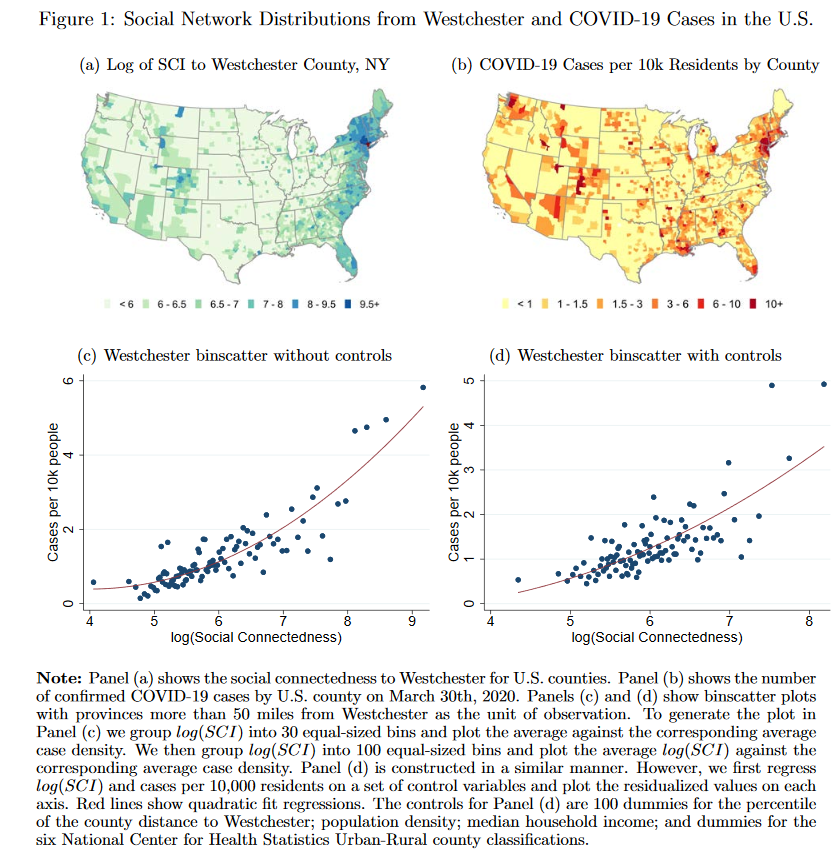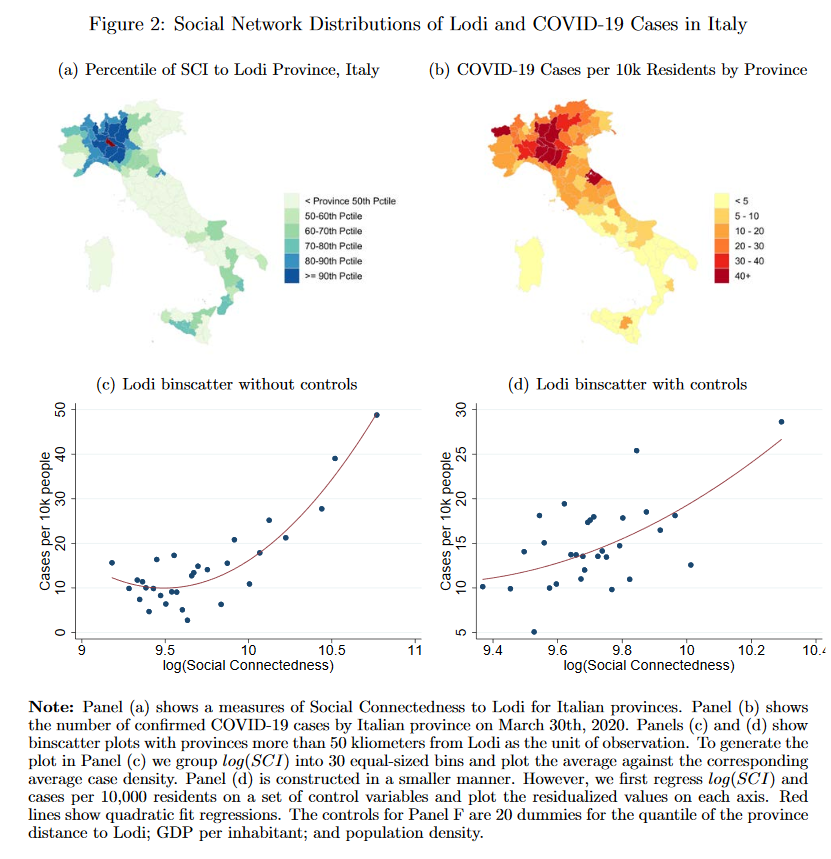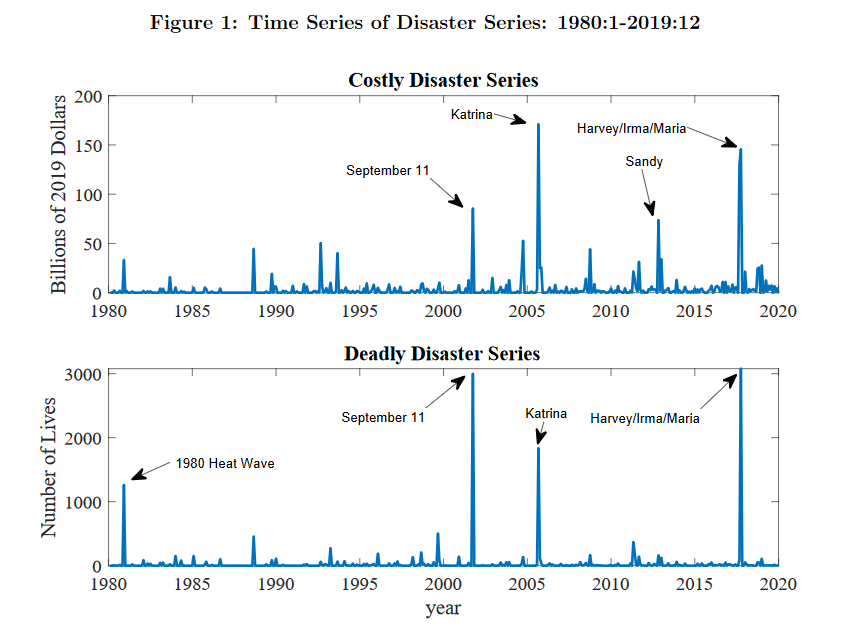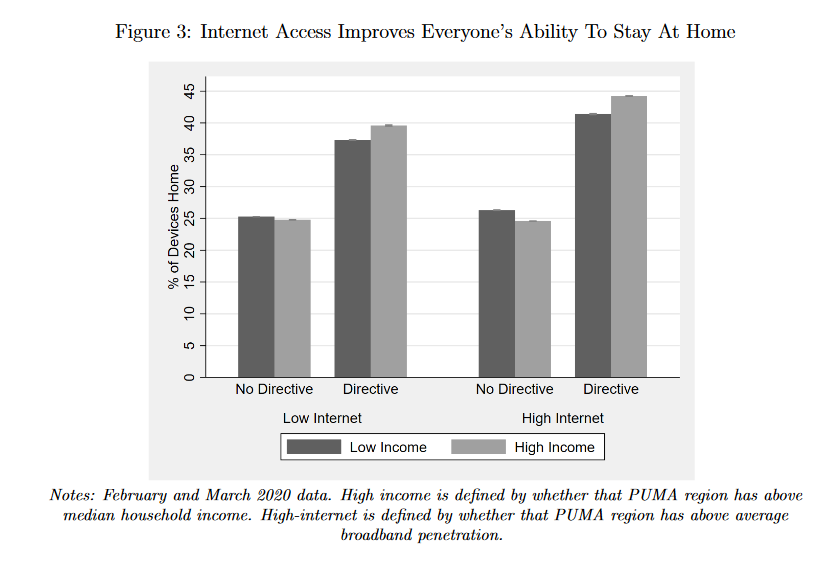QUick roundup of some #NBERday papers today! NBER is putting out a huge volume of COVID-related research and with everything else I can& #39;t read and review it all in detail.
First off:
Q: How do we REALLY know COVID mostly spreads through close personal contact?
A: Geographically aggregated patterns of Facebook friend links predict early COVID spread in the US and Italy. #NBERday http://nber.org/papers/w26990 ">https://nber.org/papers/w2...
Q: How do we REALLY know COVID mostly spreads through close personal contact?
A: Geographically aggregated patterns of Facebook friend links predict early COVID spread in the US and Italy. #NBERday http://nber.org/papers/w26990 ">https://nber.org/papers/w2...
It& #39;s a short note and obviously not dispositive. But it& #39;s interesting to find so tight a relationship even AFTER controlling for distance and demographic/economic similarity. The actual spatial structure of friendships as measured by Facebook seems to matter. #NBERday
Occurs to me:
A neat way to check if China& #39;s data is honest or not would be to see if WeChat social ties to Wuhan predict county-level COVID cases. If not, strongly suggests data is being suppressed. #NBERday
A neat way to check if China& #39;s data is honest or not would be to see if WeChat social ties to Wuhan predict county-level COVID cases. If not, strongly suggests data is being suppressed. #NBERday
This one is right up my alley: coming up with a more generalized model of disaster impacts on the economy. A bit peeved they don& #39;t label the 2011 tornado outbreaks specifically though! They were a big deal! #NBERday https://www.nber.org/papers/w26987 ">https://www.nber.org/papers/w2...
This paper tries to identify an "optimal lockdown" policy, i.e. preventing death while minimizing economic harm. Let& #39;s talk about it a little more. #NBERday https://www.nber.org/papers/w26981 ">https://www.nber.org/papers/w2...
They assume that the statistical value of a life lost to COVID is about $1.3 million. You can debate this. But it& #39;s a reasonable enough assumption given that mortality biases older. #NBERday
They also assume that as more people get infected, fatality rates rise due to hospital overcrowding. Again, reasonable enough assumption. #NBERday
In their model, they find that the optimal policy is to lock down 60% of the population with a lockdown that is 50% effective for about 4 months, and that after 200 days, 1.5% of the population will die.
wait what
#NBERday
wait what
#NBERday
1.5% of the population dying is an incredibly large amount of death, especially in an *optimal* scenario. So I think they must have something weird happening. #NBERday
I *think* the problem may be they assume 1% of the population is contagious when lockdown begins, they may be assuming an excessively high fatality rate, and their statistical value of life is low. #NBERday
The 1% is an issue because we still can& #39;t even say with total confidence *today* that 1% of Americans have been infected (lower bound is around 0.7%). If the model assumes policy begins at a very late stage, all outcomes are bad outcomes. #NBERday
Next paper:
U.S. stay-at-home orders only increase the rate of staying-at-home from about 25% to about 40%.
Simply having better internet access increases compliance another 5%. #NBERday http://nber.org/papers/w26982 ">https://nber.org/papers/w2...
U.S. stay-at-home orders only increase the rate of staying-at-home from about 25% to about 40%.
Simply having better internet access increases compliance another 5%. #NBERday http://nber.org/papers/w26982 ">https://nber.org/papers/w2...
This paper is interesting to me for a couple reasons. First, it suggests that stay-at-home orders do not in fact cause a large share of people to stay at home. Second, that the effectiveness of those orders is information-contingent. #NBERday
Third, that even in states with no directive, a quarter of people aren& #39;t leaving their house on a given day, versus, again, 35-40% in states with a directive. #NBERday
Thus, when we look at a high-internet-access jurisdiction like, say, NYC, probably *more than half* of the staying-at-home would occur *even without any order*. #NBERday
This theoretical paper shows that even if you assume people have give absolutely zero thought to the risk that they infect others and zero thought to not overloarding hospitals, they will voluntarily enact enough distancing to cut deaths by 30%. https://www.nber.org/papers/w26984 ">https://www.nber.org/papers/w2...
The argument they make is that BECAUSE people are like that, we need a central planner to act.
But it blows my mind you can look at the world today and think people act like that. #NBERday
But it blows my mind you can look at the world today and think people act like that. #NBERday
Look around you! People VERY CLEARLY are concerned about not infected others (Especially their own families). People VERY CLEARLY are trying to avoid hospitals. The model parameter treating private actors as unwilling to bear burdens for a society is empirically wrong. #NBERday
And predictably so: it& #39;s widely demonstrated that crises tend to get people to adopt more collectively-minded attitudes. This flies in the face of "shortsighted actors" as a model assumption. #NBERday
Especially since the paper right above this showed that even in the absence of stay-at-home orders lots of people do, and that such orders do not succeed in producing even a slim majority which stays at home, I think the "central planner" model is wrong. #NBERday
It is FAR MORE LIKELY that the guiding force here is information. As people acquire credible information about risks, they adjust. #NBERday
They adjust to protect themselves, to protect their family, to protect their kids& #39; futures, and to protect their neighbors and their reputation. #NBERday
It strikes me that this whole model is just skipping over the coordination problem involved in state action: it assumes that states can simply declare a reality and it shall be so.
In fact, states have to induce compliance, and usually lack resources to compel it. #NBERday
In fact, states have to induce compliance, and usually lack resources to compel it. #NBERday
That is, if there is widespread resistance to a policy, states will usually fail to fully implement it. #NBErday
This being the case, the whole question is, "How do we get private actors to internalize externalities?" One theory is, "The state commands them to do so!"
But I dunno it seems to me that& #39;s probably *not* the most effective strategy. #NBERday
But I dunno it seems to me that& #39;s probably *not* the most effective strategy. #NBERday
All of these papers "assume a central planner." They all begin by approaching it as a planning problem, an assumption that is baked into the intuitions under the SIR models they are all using. #NBERday
The "lever" you pull in an SIR model is, basically, the reproduction rate, which is basically the number of contacts (with some complexity for type of contact etc). #NBERday
Intuitively, we visualize this as a central effort, because as you fiddle with an SIR, you experience outcomes as products of your willful choices to input parameters. #NBERday
But this isn& #39;t how things work in reality. Even if you order a lockdown, there& #39;s a problem of enforcement: both logistically, and whether even a logistically capable enforcement agency will dutifully carry it out. #NBERday
I think what we actually need is a model where numerous agents with heterogenous risk preferences form constantly-changing valuations of their own self-perceived risk and their risk of infecting loved ones and risks to their reputation of infecting neighbors. #NBERday
The mechanism of valuation could be conceived of in different ways: exposure to mortality, local cases, media diet, Facebook SCI, policy changes. Probably need a variable index. #NBERday
But fundamentally, assuming that how people behave in an epidemic is "willful disregard of hospital overload and infection of others" is absurd.
People are dying at home because they& #39;re so desperate to avoid hospitals! #NBERday
People are dying at home because they& #39;re so desperate to avoid hospitals! #NBERday
This stupid hospital capacity story needs to die folks. We have THOUSANDS of people dying alone at home even as hospitals around the country are furloughing workers because there& #39;s nobody showing up at the ER. #NBERday
You can keep mumbling "but muh ICU bed capacity" all you want but ya know what? It& #39;s not even 100% clear that ventilators work for severe cases anyways, and there& #39;s growing evidence that viral load matters too, which makes ALL these models get wonky. #NBERday
If it turns out that ICU care doesn& #39;t reduce death rates much, but that "intense exposure" (i.e. in the household) creates more severe cases than "moderate exposure" (i.e. outside in the park), then all the models will have given terrible advice. #NBERday
We don& #39;t know that that& #39;s the case. But all the papers that argue for lockdowns begin by simply assuming that there& #39;s not an alternative policy measure. #NBERday
They simply assume a set of mortality parameters based on hospital capacity that simply has not been tested. We don& #39;t know how many people are infected, let alone if a higher share die when hospitals are fuller! #NBErday
It& #39;s an eminently plausible theory if, for example, ventilators do a lot to reduce deaths.
But it& #39;s not totally clear if they actually do! #NBERday
But it& #39;s not totally clear if they actually do! #NBERday
Finally, unrelated to COVID:
Eating more fish as a child is associated with lower adult cognitive capability because it turns out mercury is super bad for you. #NBERday https://www.nber.org/papers/w26957 ">https://www.nber.org/papers/w2...
Eating more fish as a child is associated with lower adult cognitive capability because it turns out mercury is super bad for you. #NBERday https://www.nber.org/papers/w26957 ">https://www.nber.org/papers/w2...

 Read on Twitter
Read on Twitter





